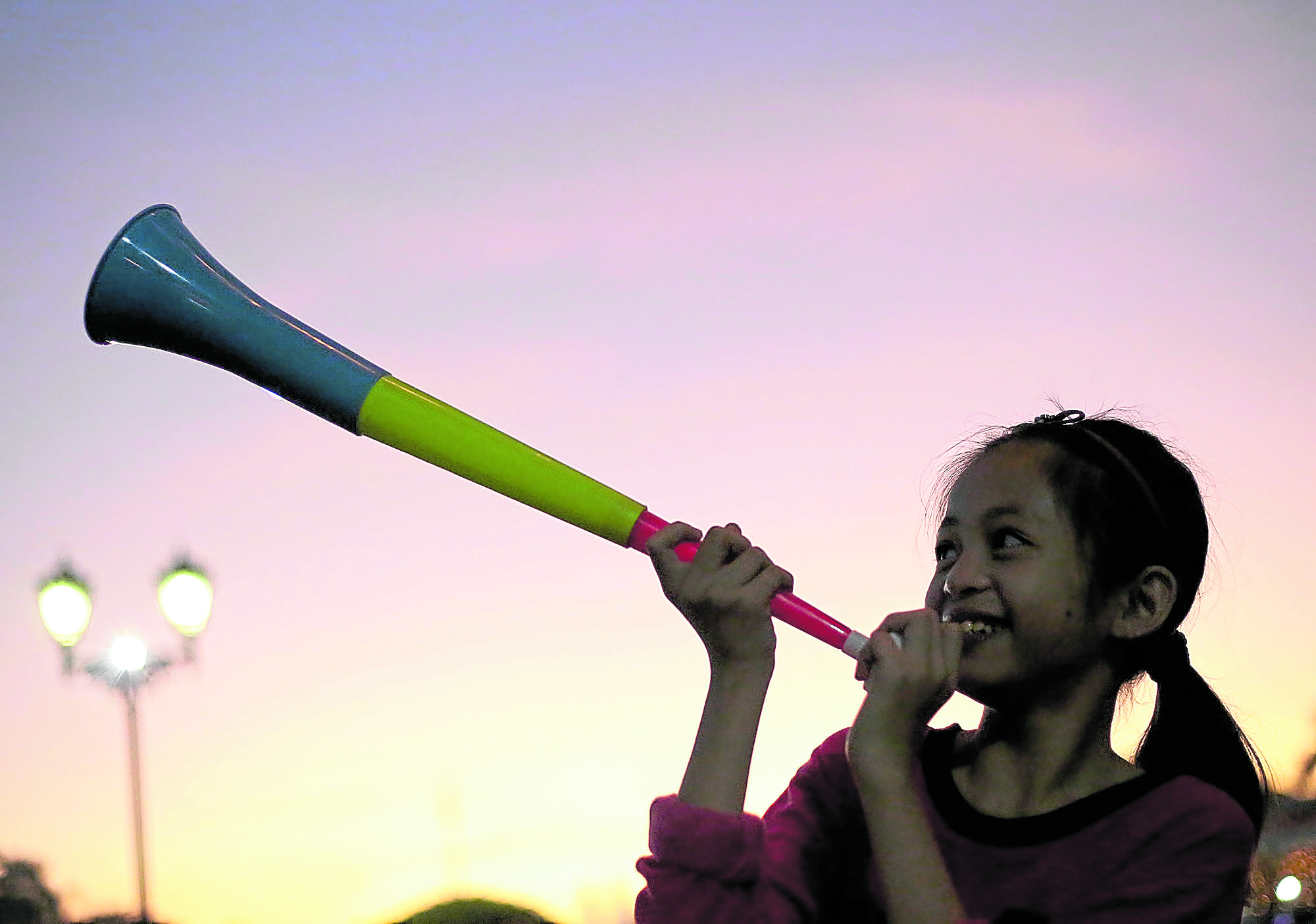
NEW YEAR’S EVE Children blow horns as they wait for the New Years countdown at Luneta Park in Manila. INQUIRER FILE PHOTO / RICHARD A. REYES
MANILA, Philippines — Due to the COVID-19 pandemic, health officials have discouraged the use of trumpets and whistles as an alternative to firecrackers in welcoming the New Year.
During the launch of the government’s annual anti-firecrackers campaign, an official from the Department of Health (DOH) said the saliva from used trumpets and whistles may be a source of transmission of the virus that causes COVID-19.
“What is new for this year’s campaign is we don’t recommend the use of noisemakers using the mouth that will cause the transfer of saliva, like whistles and trumpets,” Health Undersecretary for Public Health Services Myrna Cabotaje said during the online launch on Thursday.
Avoid noisemakers
Due to the pandemic, the DOH urged the public to avoid noisemakers that could transmit COVID-19 and other diseases via saliva.
The DOH instead recommended seven alternatives to firecrackers: drums, car horns, pots and pans, coin banks, tambourines, glow sticks, and playing loud music.
Cabotaje also reiterated the official warning against holding large social gatherings to celebrate Christmas and the New Year, saying this could lead to a surge in COVID-19 cases.
Health standards
“Given the pandemic, we must continue to adhere to minimum health standards, such as use of face masks, sanitizing hands, and maintaining social distancing,” she said.
The DOH suggested face masks and face shields as Christmas gifts to remind the receiver to wear them while the country remains in the grip of the COVID-19 pandemic.
The public has been warned not to let their guard down as the DOH reported 1,383 new confirmed coronavirus infections and 24 additional deaths on Thursday.
The 1,383 new cases brought the official number of COVID-19 cases to 445,540, of which 27,781 are still active.
The DOH announced that 24 more people died of COVID-19, including 11 who were previously tagged as recovered, which raised the total death toll to 8,701.
At the same time, 133 more people have recovered from the disease, so COVID-19 survivors now total 409,058, or 91.8 percent, of the total cases.
Less the recoveries and deaths, there are still 27,781 people who are still infected with the coronavirus, which is 6.2 percent of the total confirmed cases.
Nine laboratories were not able to submit their data, according to the DOH.
Clinical trials
Science Secretary Fortunato dela Peña on Thursday said only the COVID-19 vaccines of the Chinese firms Sinovac Biotech Ltd. and Clover Biopharmaceuticals Inc. have been given clearance to conduct clinical trials in the Philippines.
Speaking at the televised Laging Handa public briefing, Dela Peña said the Sinovac and Clover vaccines have been both cleared by the government’s vaccine evaluation panel and ethics board.
The vaccines of United States-based Janssen Pharmaceuticals and British firm AstraZeneca have obtained ethics clearance and are just waiting for the conclusion of vaccine evaluation, Dela Peña added.
The secretary said it would be the Food and Drug Administration (FDA) that would give the final approval for the vaccines and would also oversee the clinical trials.
Procurement
As for the World Health Organization’s Solidarity Trials for COVID-19 vaccines, Dela Peña said the Philippines was only awaiting the announcement on what vaccines would be tested.
Meanwhile, presidential spokesperson Harry Roque said President Rodrigo Duterte expressed confidence that the country’s procurement of vaccines would not be hounded by bribery allegations such as those hurled against Sinovac.
“We are consistently saying that we will only allow the use of vaccines that are proven to be safe and effective against COVID-19. The President has full trust in [FDA Director General Eric] Domingo, so when it comes to allegations on bribery, my view is that that won’t happen in the Philippines,” Roque said at a briefing.

